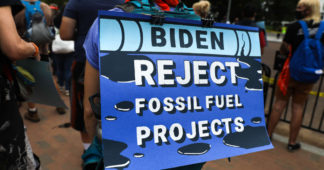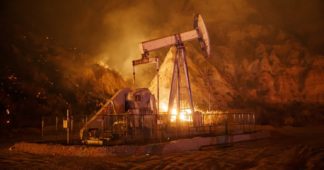Following the Ukraine conflict, American energy firms have taken the opportunity to increase energy production putting action against climate crisis on the back-burner.
May 25, 2022
New analysis shows that US oil and gas firms took advantage of energy worries over the Ukraine conflict to push their fossil fuel products and resist climate change regulatory measures.
The London-based think tank InfluenceMap analysed advertisements and declarations by the companies in the weeks before and after Russia’s incursion into Ukraine on February 24.
It said the companies spread the misleading message that US climate change policies were to blame for rising energy prices and that more US-produced oil and gas was the solution.
As Western countries that import Russian hydrocarbons looked for alternatives in order to cut ties with Russia, InfluenceMap detected “an active effort from the US oil and gas industry to capitalise on the war in Ukraine”.
They pushed “long-standing policy asks relating to the continued expansion of oil and gas,” despite the widely-documented role such operations play in driving deadly global climate change, InfluenceMap said.
The group identified one of the key players in the messaging effort as the American Petroleum Institute, a lobbying organisation that has numerous major fossil fuel companies among its members.
InfluenceMap said it detected a surge in the number of ads about US-based energy and energy independence placed via one of the API’s Facebook pages in the weeks before and after the Russian invasion.
One series of ads received nearly 20 million views on the social platform.
Surge in prices
“The sector has quickly mobilised around the war in Ukraine and high gas prices to promote the need for more ‘American-made energy’, often relying on potentially misleading or questionable claims,” InfluenceMap Program Manager Faye Holder said in the report.
It also analysed public statements by oil and gas executives, finding that several of them publicly blamed climate change policies or promoted US-produced energy as part of the solution to the energy crisis.
The report documented cases where it said the sector had succeeded in securing some of its demands since the start of the conflict, such as a commitment by authorities to speed up approvals for new gas projects.
Many posts by users on social media have blamed a surge in gasoline and crude oil prices on US President Joe Biden’s decisions to limit drilling and to halt the Keystone XL pipeline project as part of his low-carbon energy transition plan.
We remind our readers that publication of articles on our site does not mean that we agree with what is written. Our policy is to publish anything which we consider of interest, so as to assist our readers in forming their opinions. Sometimes we even publish articles with which we totally disagree, since we believe it is important for our readers to be informed on as wide a spectrum of views as possible.
![Oil And Gas Giants Spend Millions Lobbying To Block Climate Change Policies [Infographic] Oil And Gas Giants Spend Millions Lobbying To Block Climate Change Policies [Infographic]](http://www.defenddemocracy.press/wp-content/uploads/2021/10/climate-change-324x170.png)










